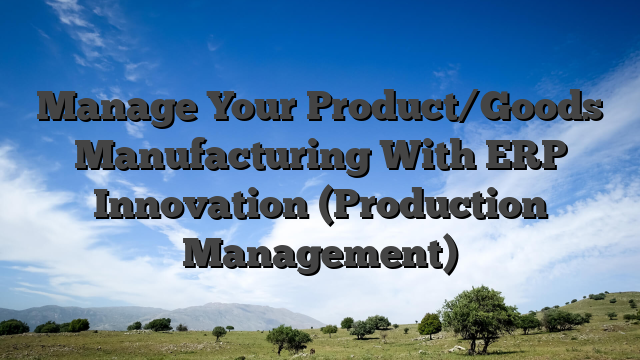In the dynamic world of product manufacturing, efficiency is paramount. Staying ahead of the competition means embracing innovative solutions that optimize every facet of production. This is where Enterprise Resource Planning (ERP) systems come into play, transforming the way businesses manage the intricacies of production. In this blog, we will explore how ERP innovation revolutionizes production management, streamlining processes, enhancing decision-making, and ultimately boosting the bottom line.
The Role of ERP in Modern Production Management
Production management, in a manufacturing context, encompasses the planning, control, and execution of all aspects of product manufacturing. It involves orchestrating resources, schedules, and processes to ensure that products are efficiently and consistently produced.
Enter enterprise resource planning systems, the powerhouse behind this intricate dance. ERP solution providers a comprehensive, integrated suite of applications that allow manufacturers to handle all aspects of production management with a single, unified system. These systems consolidate data from various departments such as sales, inventory, and finance, offering a holistic view of the entire production process. Here’s how ERP innovation plays a crucial role in transforming the production landscape:
1. Streamlined Processes
The manufacturing process involves numerous steps and components. From inventory management to work orders, quality control to demand forecasting, ERP systems bring order to the chaos. These systems facilitate seamless communication between different departments, reducing manual data entry, streamlining workflows, and minimizing the chances of errors.
2. Enhanced Decision-Making
In today’s fast-paced manufacturing environment, timely and data-driven decisions are non-negotiable. ERP systems provide real-time visibility into the production process, offering key performance indicators (KPIs), analytics, and insights that empower decision-makers. Whether it’s adjusting production schedules to meet sudden demand spikes or optimizing resource allocation, ERP innovation ensures that decisions are informed and agile.
3. Improved Resource Utilization
Efficiently managing resources is the cornerstone of production management. ERP solutions allow manufacturers to optimize the use of assets, labor, and materials. Through precise demand forecasting, automated inventory control, and resource allocation, these systems ensure that every resource is used to its maximum potential.
4. Quality Control and Compliance
Manufacturers operate within strict quality and compliance standards. ERP systems integrate quality control measures into the production process. They facilitate the tracking and monitoring of product quality, regulatory compliance, and adherence to industry-specific standards. This not only ensures product quality but also reduces the risk of costly non-compliance issues.
5. Demand Forecasting and Inventory Management
Accurate demand forecasting is essential to prevent overstocking or understocking of inventory. Enterprise resource planning software use historical data and sophisticated algorithms to predict demand trends. This allows manufacturers to maintain optimal inventory levels, reducing carrying costs and ensuring products are readily available to meet customer orders.
6. Real-time Communication and Collaboration
Effective production management requires seamless communication and collaboration among teams. ERP solutions enable real-time sharing of information and updates across various departments, fostering a culture of transparency and cooperation. This results in faster issue resolution, better resource allocation, and a more agile response to changing market conditions.
7. Scalability and Adaptability
As businesses grow, they need scalable solutions that can adapt to changing requirements. ERP systems are designed to grow with your business. Whether you’re expanding into new markets, introducing new products, or altering your production processes, enterprise resource planning solution can adapt to these changes while maintaining efficient production management.
8. Data Security and Disaster Recovery
Protecting sensitive manufacturing data is critical. ERP systems include robust security features to safeguard against data breaches. Additionally, they often provide disaster recovery capabilities, ensuring that your production data is safe even in the face of unforeseen events.
A Look at ERP Innovation
ERP systems have evolved significantly over the years. Modern ERP solutions are characterized by several innovative features that further enhance their effectiveness in production management:
1. Cloud-based ERP Solutions: Cloud-based ERP solutions offer flexibility, accessibility, and reduced IT infrastructure costs. These solutions allow you to access your production data from anywhere, enabling real-time decision-making and remote collaboration.
2. Mobility: Mobile ERP applications allow production managers and teams to access vital information, make decisions, and approve processes on the go. This feature empowers businesses with the agility to respond to production challenges promptly.
3. Internet of Things (IoT) Integration: IoT sensors embedded in machinery and production equipment can collect real-time data. This software can integrate with IoT devices to provide continuous monitoring and data collection, enabling predictive maintenance and process optimization.
4. Artificial Intelligence (AI) and Machine Learning: AI and machine learning capabilities are integrated into ERP systems to offer predictive analytics. Manufacturers can use AI-driven insights to make data-driven decisions, enhance forecasting, and improve production processes.
5. Supply Chain Integration: Designed to integrate seamlessly with supply chain management software. This integration ensures that your production process is synchronized with the supply chain, improving efficiency and reducing lead times.
6. Integration with Third-party Applications: Modern systems allow for the integration of third-party applications and extensions, enabling you to tailor your ERP solution to your specific production management needs.
Key Considerations for Implementing ERP Innovation in Production Management
Implementing ERP innovation for production management is a significant undertaking. To ensure a successful transition, consider the following key points:
- Assess Your Business Needs: Understand your specific production management requirements, and choose an ERP solution that aligns with your business goals.
- Data Migration: Migrating existing data to the new software can be complex. Plan the migration process carefully to ensure a smooth transition.
- User Training: Invest in thorough training for your production team. Users should be proficient in the enterprise resource planning system to leverage its capabilities effectively.
- Change Management: Prepare your team for the change. Communicate the benefits of the new system, and establish a support system to address any concerns or challenges that arise during implementation.
- Continuous Improvement: Use the analytics and insights provided by continuously improve your production management processes. Regularly assess and adjust your workflows to optimize efficiency.
In Conclusion: Embrace ERP Innovation for Efficient Production Management
In the competitive landscape of modern manufacturing, optimizing production management is a strategic imperative. ERP software companies a pivotal role in streamlining processes, enhancing decision-making, and ensuring that production resources are used efficiently. As you consider adopting an ERP system, assess your business needs, prioritize data migration and user training, and be prepared for change management. The successful implementation of ERP innovation can empower your manufacturing business to thrive in a dynamic and ever-evolving market. Whether you’re a small manufacturer looking to boost efficiency or a large-scale operation seeking greater control, ERP innovation is the key to efficient and profitable production management.




